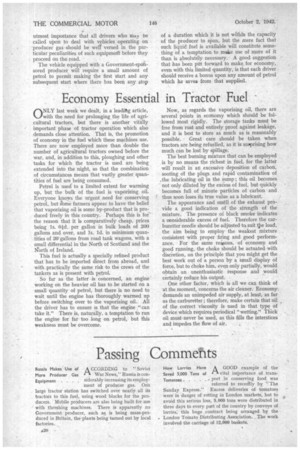Inevitability of Gas Producers
Page 21

Page 22

If you've noticed an error in this article please click here to report it so we can fix it.
Points to be Considered by Those Who Will be Required to Use Suction Gas
MANY .things have been said against the gas producer as designed for the commercial vehicle, whilst a few points Save been made in its favour. The ultimately important factor is, however, that by employing it liquid fuel can be saved, and the majority of vehicles, particularly those with a reasonably high power-weight ratio, can be operated on producer gas with a fair amount of success. Loss of power there must be, and it will probably be a considerable time before filters have been rendered so efficient as to reduce the wear on cylinders to an extent approximating to that obtained when power units are run on petrol or oil.
What we wish to impress upon operators, however, .is that those who are selected to have the whole or, part of their fleets equipped with producers will have no option in the matter. It will be a question of using producer gas or laying up their vehicles.
As is well known, the present scheme covers the production of 10,000 equipments, and we understand that the majority of these will be of the built-in type, mainly for the reason that if trailers were to be employed to any large extent they would necessitate the consumption of a considerable number of pneumatic tyres. The above total is, however, only a beginning, and we have little doubt that Sir Alfred Faulkner, with the advice of the Committee relative to this subject, will, next year, require far more rapid strides to be made, and it may be that the total will eventually reach 100,000.
Those Who Will Equiperehicles It is understood that Austin, Bedford, Commer, Fordson and Morris-Commercial vehicles will be equipped with authorized producers by their respective makers and dealer organizations.
At present, the allocation of producers is said to be 7,500 to goods-vehicle operators and 2,500 to those running, passenger vehicles, whilst included in the former total will be vehicles for Services and Government Departments. Whether this ratio will hold good for a further increase in the total remains to be seen. So far, we believe that three manufacturers have been appointed to produce the Government type of equipment, which will be made in two designs for goods and passenger vehicles.
There appears to be no actual ban upon the manufacture of any other type, but there is a virtual cessation of the production of these goods because only those makers who receive official encouragement will be able to obtain the necessary supplies of material.
There have been suggestions that there will be difficulties in connection with the supply of sufficient fuel of the requisite quality, but sight has not been lost of this problem, and it is being tackled side by side with the constructional programme. This solid fuel will not be rendered available through the ordinary channels i.e., from the coal merchants, but will be marketed by selected garages or fuel stations. This is probabty the best method and will allow a closer check to be kept upon the outgoings.
Factors Which Make for Success Now, as regards the actual operation of vehicles running on producer gas, whether or not success is to be achieved with them will undoubtedly depend largely upon the attitude of the drivers concerned and the care and attention which these men—or women—can be persuaded to give to their new charges. Hitherto there has been an inclination amongst drivers to look upon the producer as an additional source of annoyance, and one which was not to be encouraged. As a matter of fact, drivers of all classes of vehicle, commercial or private, have become somewhat spoilt of recent years, for the reason that vehicles have become so efficient that the average driver has had to pay little attention to them, except so far as merely controlling them was concerned. In only a few cases have they had to attend even to minor points of maintenance, although, since the war, difficulties in obtaining labour have necessitated their giving a little more attention to this particular matter.
On the other hand, the employment of even the best of gas producers involves more care, both in driving and in maintenance, than does the corresponding carburetter or injection pump of the petrol or oil engine. Consequently, it is of the utmost importance that all drivers who may be called upon to deal with vehicles operating on .producer gasshould be welt versed in the particular peculiarities of such equipmen't before they proceed on the road.
The vehicle equipped with a Government-sponsored producer will require a small amount of petrol to permit making the first start and any subsequent start where there has been any stop of a duration which it is not within the capacity of the producer to span, but the mere fact that such liquid fuel is available will constitute something of a temptation to make use of more of it than is absolutely necessary. A good suggestion that has been put forward to make for economy, even with this limited quantity, is that each driver should receive a bonus upon any amount of petrol which he saves from that supplied.




























































